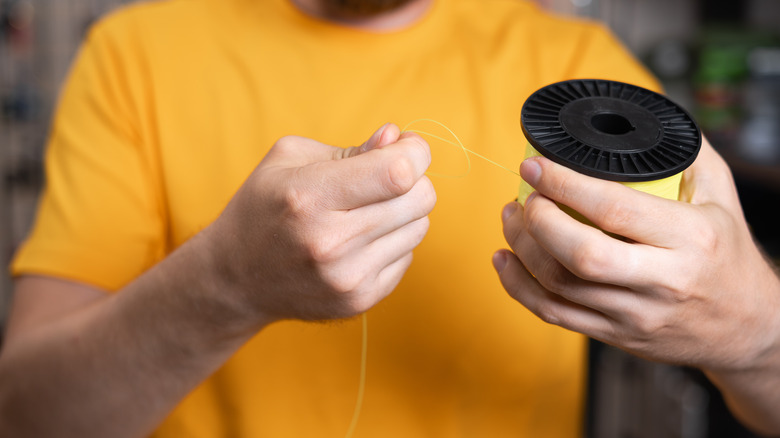Is Fishing Line The Key To A Deer-Free Garden?
Deer are majestic creatures. They are stunning and elegant ... until you discover they have destroyed your garden. Unfortunately, few reliable options exist to keep these large, often hungry pests out of your garden. The conventional advice for protecting your crops from deer is installing a 7-foot fence. There's no doubt that this option works, but it comes with a hefty price. Even if you install the fencing yourself, materials alone will cost you big bucks. Luckily, a few fence posts and some fishing line are considerably less spendy and will probably help keep the deer away.
Before we get into the whys and hows of using fishing line to this end, let's talk about the situations in which it will and will not work. This barrier can only help in enclosed areas, like a vegetable garden. While you could theoretically wrap fishing line around your entire landscaped space in front of your home, randomly placed fenceposts and invisible fishing line is unattractive and may be problematic for people visiting your home. Imagine someone walking into your yard and getting tripped up by your deer deterrent! As such, selecting deer-resistant ornamental plants is best for areas where 360-degree protection is undesirable.
How fishing line works to keep deer out of your garden
Clearly, some fishing line and a few posts will not replace the guaranteed garden protection that a 7-foot fence provides. However, if a large fence is not in your budget, this may be a decent option. It's also an excellent alternative to electric fencing, which can be problematic for many reasons. If you have small children or live in a community, you certainly do not want to be responsible for someone getting a massive shock while visiting your garden. (Or if, like us, you may be a bit clumsy while you work, an electrified fence could result in a big ouch!)
The reason fishing line works is that deer cannot see it. So, the deer is just walking along, headed toward what looks like a feast in your garden, and she runs straight into an invisible barrier. She becomes confused. Even if the top of the fishing line fence is low, around 4 feet tall, she cannot see it. In her bewilderment, she is doubtful to jump over this force field you have created around your garden. Miss Deer will leave your garden alone while she walks away unharmed. The downside of this barrier, and why it does not compare to a fence, is that it can break. If you have a particularly determined deer, there is no guarantee it will not break the line or find another way in.
How to install fishing line around your garden
The best part of using fishing line as an invisible fence is that you do not have to dig post holes or set anything in cement. All you need are some T-posts and enough clear fishing line to go around your garden a few times. That said, you will also need something to use as a gate unless you want to try to crawl in and out between lines.
For this project, you will need enough 5-foot T-posts to go around your garden installed about 15 feet apart. You can use a post driver or whatever process works best for your soil type. Once your posts are in place, tie your line to the top of the post closest to your gate. Wrap the fishing line all the way around your garden and tie it off at the post at the other side of your gate. Repeat the process one foot lower, and continue until you reach one foot above the ground. That's it! No heavy lifting and no budget-breaking investments. However, be sure to keep the lines free of growing vegetation and do not hang anything on them because that will help deer see where the lines are.

